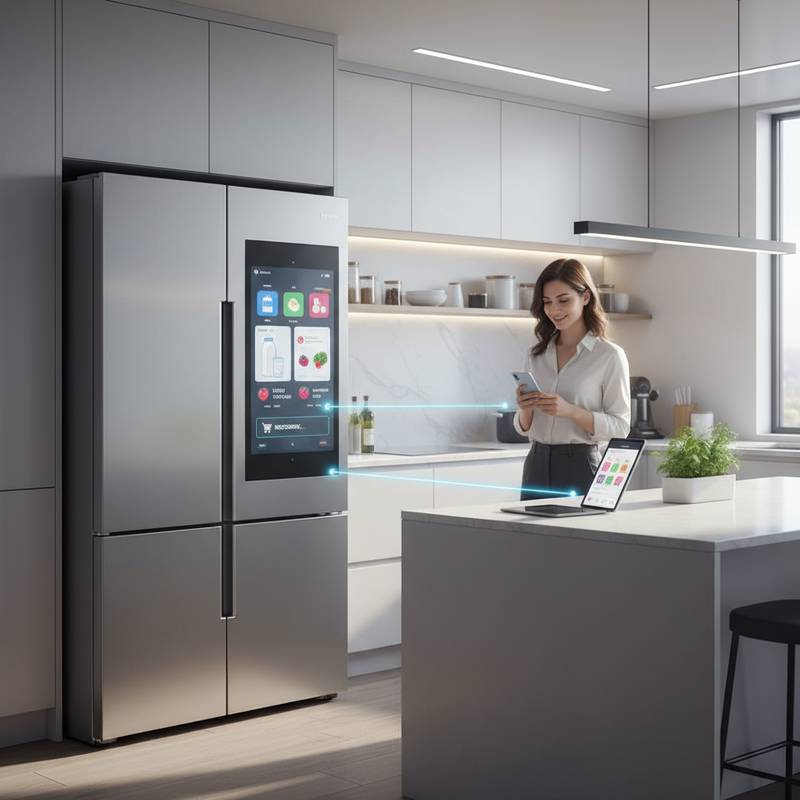AI Fridges Auto-Order Groceries Before Running Out
Smart homes represent more than futuristic concepts. Connected devices manage tasks from lighting adjustments to laundry cycles, and the kitchen emerges as the primary area for advanced automation. The most recent development, AI-powered refrigerators, tracks groceries, anticipates consumption patterns, and automatically reorders essentials before shortages occur. This innovation alters approaches to shopping, cooking, and food management.
These refrigerators eliminate barriers in grocery procurement while enabling families to conserve time, minimize waste, and sustain well-stocked kitchens with minimal intervention.
The Fridge That Anticipates Needs
Consider accessing your refrigerator to discover that it has already ordered milk, eggs, and vegetables prior to depletion. Contemporary AI refrigerators employ internal cameras, weight sensors, and pattern recognition software to observe stored contents. The system evaluates usage rates, cross-references historical data, and initiates orders via linked retailer accounts.
Algorithms refine predictions based on evolving preferences. For instance, if oat milk serves as the standard choice over whole milk, the refrigerator records this detail for future reorders. Brand changes prompt immediate adaptation. Integration with recipe applications allows suggestions for meals using current stock or items nearing expiration.
Benefits for Daily Routines
Grocery procurement poses a persistent burden for occupied households. Research indicates that individuals dedicate several hours monthly to planning, purchasing, and replenishing supplies. Intelligent refrigerators reclaim this time through automated restocking processes.
The advantages surpass mere ease. Monitoring usage and expiration dates curbs excess purchases and spoilage, which translates to financial savings and reduced environmental impact. Furthermore, inventory-based recommendations promote nutritious meal selections that align with available ingredients.
Parents, working professionals, and those seeking streamlined operations benefit most. The kitchen evolves from a mere storage area into a dynamic, self-regulating environment tailored to individual lifestyles.
Core Technology Components
Computer vision, machine learning, and cloud integration form the foundation of these refrigerators. Internal cameras photograph shelves and compartments, while software identifies products and monitors quantities. Consumption trends for each family member emerge through ongoing analysis.
Weight sensors under shelves register removals or depletions, prompting inventory updates and virtual shopping list modifications. Compatible models link to services like Amazon Fresh, Instacart, or regional supermarket systems for seamless ordering and delivery coordination.
Data handling prioritizes security via encrypted cloud platforms. Manufacturers provide customizable privacy options, enabling control over shared or retained information. Such measures foster confidence in increasingly independent appliances.
Practical Implementations
Leading manufacturers integrate AI features into existing lines. Samsung Family Hub refrigerators feature cameras for remote content viewing via mobile applications. LG ThinQ models synchronize with voice assistants to facilitate reorders through partnered services. Whirlpool collaborates with retailers to enable touchscreen-initiated suggestions.
Emerging companies offer retrofit solutions, such as add-on sensors that upgrade conventional refrigerators with inventory tracking. These affordable options broaden access to smart features across various income levels.
Enhancing Convenience
The primary draw of AI refrigerators lies in their ability to prevent disruptions. Eliminate urgent store visits or overlooked staples. The appliance maintains household operations by forecasting requirements and executing orders proactively.
Picture returning from work to delivered essentials. The refrigerator detected shortages in yogurt and orange juice, processed the purchase, and refreshed the digital log. Users intervene only for approvals or tweaks via the companion application.
Promoting Sustainability and Efficiency
These devices support eco-friendly practices by precisely gauging needs, which discourages overstocking and waste. Food discards account for significant household resource loss, both economically and ecologically. Proactive spoilage prevention yields dual benefits.
Advanced units adjust cooling based on occupancy and contents, optimizing energy use while preserving freshness. Pairing with solar energy sources or efficient systems amplifies long-term reductions in consumption.
Addressing Potential Drawbacks
High initial costs distinguish AI models from standard units, although market expansion should lower prices. Integration challenges arise with unsupported retailers or varying regional services.
Privacy concerns intensify with data collection on habits. Transparent controls and strong encryption remain vital for user assurance. Clear policies on data practices build essential trust.
Accuracy influences adoption. Erroneous orders or inventory errors demand occasional manual corrections. Progress in algorithms minimizes such issues, yet vigilance ensures optimal performance.
Shifting Grocery Habits
Widespread use of AI refrigerators redefines procurement strategies. Automated, continuous restocking replaces rigid weekly plans. Retailers adapt with appliance-compatible subscriptions.
Personalization intensifies as systems favor preferred organics or brands without prompts. Future developments may predict desires alongside necessities, enhancing relevance.
Individuals gain freedom from administrative details, redirecting energy toward culinary creativity. Budget oversight improves through expenditure analysis and economical substitutions.
Advancing Connected Kitchen Ecosystems
AI refrigerators integrate within broader connected kitchen networks, where devices collaborate for fluid workflows. An oven might preheat according to a refrigerator-suggested recipe, while pantry trackers align with fridge data for comprehensive oversight.
Unified platforms link ovens, dishwashers, and brewers, positioning the refrigerator as the coordination center. Voice commands, app interfaces, and forecasting tools enhance responsiveness.
Integrating AI for Streamlined Kitchens
AI refrigerators advance toward simplified domestic operations by automating drudgery, curbing excess, and organizing essential spaces. Future iterations will deepen lifestyle insights for refined support.
Prospective buyers should prioritize service compatibility and platform alignment. Review privacy configurations, experiment with automations, and customize settings. The system adapts progressively, easing routines and elevating efficiency.
Proactive smart environments emerge, with AI fridges exemplifying seamless task handling that prioritizes user priorities.
